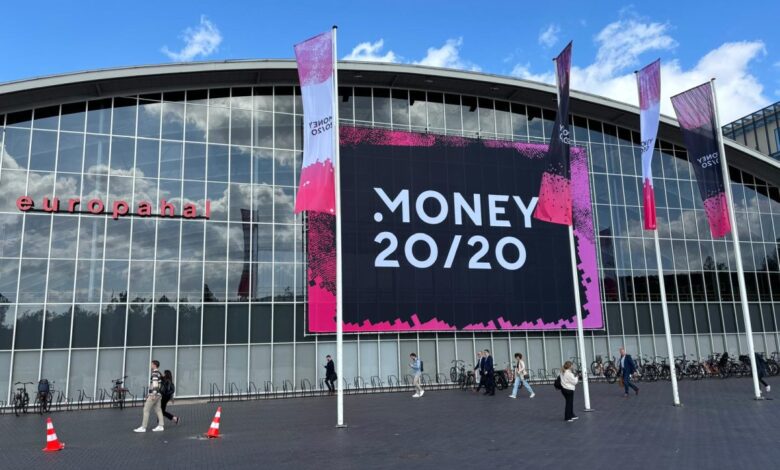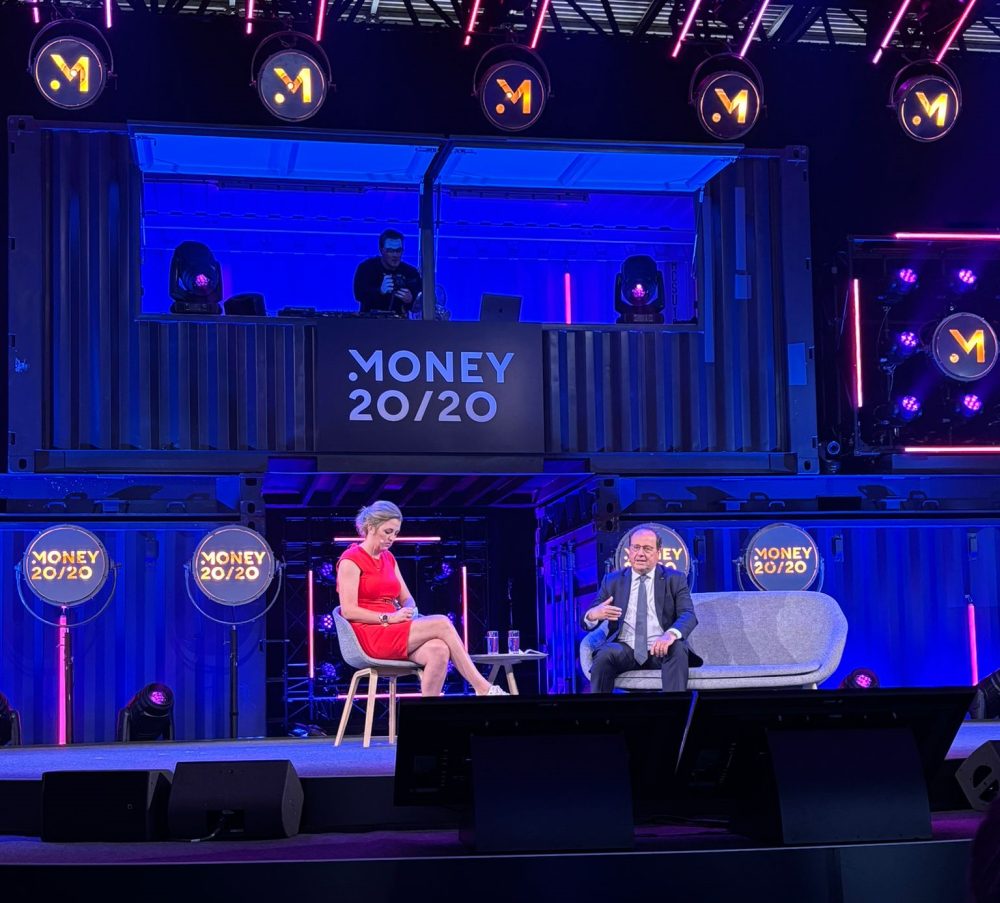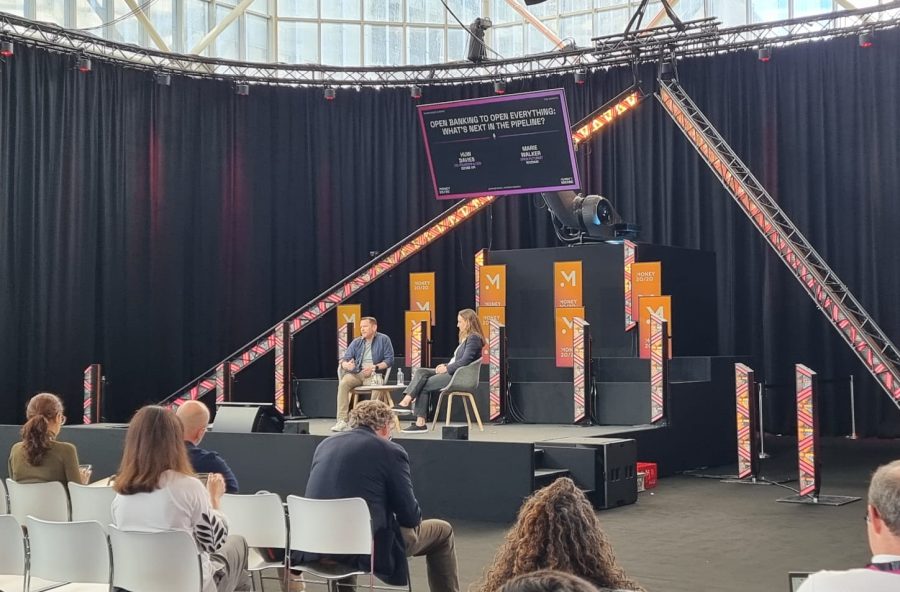Money 20/20 Europe 2024: Day Two in Amsterdam

On day two of Money20/20 Europe 2024, François Hollande, the former French president, delved into his efforts to position France as a tech leader, highlighting tax incentives, the creation of the French public bank, and a flourishing startup scene with 33 unicorns.
There was a full house for Hollande, who sat down on the Exchange Stage for a conversation with Money20/20’s chief strategy and growth officer, Scarlett Sieber, covering everything from fintech-focused policies he implemented between 2012 and 2017, to the future of fintech in France.
Hollande explained what he was most proud of during his time as President: “I created a public bank to support emerging technologies and entrepreneurs. Now, 10 years after, I look back on this as being one of the most important investors in the French tech sector.”
Sieber also asked him whether Macrom’s aim to ensure there are 100 French unicorns by 2030 was achievable, considering only two were made last year.
“The problem of all President’s promises are that we don’t see the results until after their departure,” Hollande quipped. “Perhaps it will happen in the long term, but in the short term, it’s a bit more difficult.”
Hollande also addressed political challenges, discussed Europe’s tech potential against giants like the US and China, and stressed the importance of greentech investments and tech education reform. Wrapping up with AI, he rated its current state a five out of 10 signalling optimism but acknowledging room for growth.
Open everything
In an insightful discussion at The Summits & Bar on Wednesday, Huw Davies, co-founder and CEO of Ozone API, and Marie Walker, open futurist at Raidiam, discussed the evolution of open banking into ‘open everything’.
They explored how embedding financial services into sectors like healthcare and transportation can unlock new market opportunities and enhance user experiences. Walker addressed strategic advantage for data providers in embracing reciprocity and innovation to thrive in the emerging data economy.
Meanwhile, Davies highlighted the importance of leveraging common infrastructure and industry collaboration to accelerate progress, noting that regulators and industry coalitions are pivotal in this transformation.
“One of the really interesting things we’re seeing is there’s a recognition that this can all be massively accelerated, if the industry works together to leverage common and shared infrastructure.”


B2B payments reimagined
Despite a whole host of technological innovations transforming the payments space, B2B transfers and instant payments remain inefficient. On the Na.i.ture Stage in the morning, Callum Burroughs, correspondent at Business Insider, moderated a chat about how the coming era of automated finance could reshape the customer experience.
Seamus Smith, group president of global business-to-business payments at FIS, explained how new technologies could change the game for B2B payments: “The mission business-to-business has to embrace is looking forward, and that’s what AI will enable with machine learning and other really developed data analytics. But I would say that we’re at a fairly early stage. AI is a very powerful tool, but it’s one that needs to be looked after carefully by the industry.”
Later, Emma Hagan, chief risk and compliance officer at ClearBank, discussed the difference in regulations across different regions: “In the digital assets space, European regulation is already pretty developed through MiCA. That really does offer regulatory certainty to ensure people clearly understand the rules. Then that creates a level playing field that helps you understand where you can innovate, and what there’s not an appetite for. However, in the UK, those proposals are still undeveloped.”


Why payments can’t be an afterthought
The theme of payments continued throughout the morning, with the next panel discussing the importance of meeting customer expectations.
“Payments are all about optionality and simplicity,” explained Sameer Kurani, EMEA head payments solutions specialist at J.P. Morgan. “Historically, payments have typically been a final event at the end of a checkout. What is increasingly relevant for merchants is that payments can drive revenue customised to their customer experience. For example, thinking about subscription services as a mechanism to drive customer adoption and retention and that needs to be thought of at the beginning of building that experience.”
Johan Strand, CEO at Zimpler, also offered insight: “From our perspective, we’re seeing an interesting trend. If you start a business in Stockholm today, no one is thinking about how they can make the business work in Stockholm alone. They’re thinking about going global immediately. Payments are almost going the other way around – from global to local. They’re trying to now offer hyper-local payment methods, that tailor to a niche market and customer segment.”
Finally, Bono van Nijnatten, general manager of payments at ASOS, looked to the future for the payments industry: “If you look at the checkout in the near future, AI is going to play an even more important role in enabling personalisation. It will help to know who each specific customer is and know what they want.”
Partnerships in payments
Next up on the Na.i.ture Stage – our editor in chief Claire Woffenden moderated a fireside chat alongside John Gutch, fintech product director, Etc. at BT Group, and Alexa von Bismarck, president – EMEA at Adyen, delving into their partnership to enable small business customers to accept in-person contactless payments with Tap to Pay on iPhone.
The focus was on the importance of trust, established relationships and strategic partnerships in disrupting the payments ecosystem for small businesses and reaching new customers. So how are Adyen and Etc. getting it right?
Gutch commented: “We were never coming into this partnership hoping to sign a contract and have a monthly account meeting. With our teams working as closely as they do, we see ourselves as one team. I think that’s the one thing I’d say to anyone who’s looking to get into a partnership: how can you create that one-team view?
“Collaboration is key in the whole fintech space. You walk the floors here and you see tonnes of businesses out there offering very similar stuff which is great, but actually when you double down and really focus on what’s important, which is the customer and customer experience, then we’ve managed to unlock it.”
While von Bismarck explained how the solution could help small businesses attract new customers: “Customers have a very high expectation. They want to pay how they are used to paying. For the SMB space, it’s all about unlocking an area they weren’t able to attack before. We found that 27 per cent of customers don’t even carry a wallet, while 55 per cent of customers will abandon a shopping cart if there’s no opportunity to pay how they like. That’s why it’s so important to enable an area for businesses that weren’t previously able to accept those payments before.”





